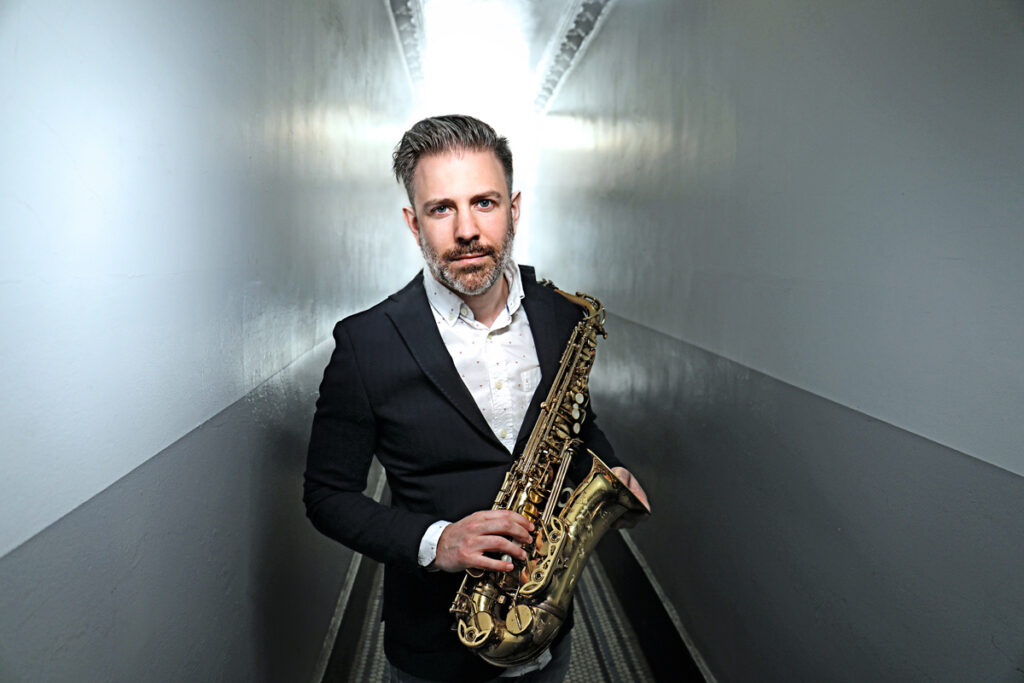Saxophonist Randal Despommier to Release New Album “Dio C’è” on Feb. 5th, 2021
New Orleans-Bred, New York-Based Saxophonist Randal Despommier Makes his Leader Debut on Record with Dio C’è, Co-Produced by Jimmy Haslip and Including Such Soloists as Guitarist Ben Monder
Dio C’è – to be released via Outside In Music on February 5, 2021 – presents Despommier’s lyrical, transporting originals, plus imaginative reinventions of a popular Italian film ballad and a top 10 mid-’90s rock hit by Stone Temple Pilots, “Big Empty”
Alto saxophonist and composer Randal Despommier grew up in Metairie just outside New Orleans, with some of his first public performances at Mardi Gras parades alongside his dad, a trad-jazz drummer who studied with Crescent City icon James Black. The saxophonist was a punk- and grunge-loving kid in his teenage years, while still playing funk, R&B and jazz gigs in New Orleans. Later, Despommier would direct church choirs and play organ for services in Boston, and he eventually earned his D.M.A. at the New England Conservatory. Now 38, and based in New York City since 2013, he recorded and toured a 2018 duo album with kindred-spirit keyboardist Jason Yeager, All at Onceness (“compelling,” according to the Boston Globe; “sumptuous,” said KUCI-FM). Earlier this year, they brought this project to China as part of a tour which included a debut performance at the Qintai Concert Hall. Now, Despommier has encapsulated his many-faceted musical world with his debut album as a leader, Dio C’è. Co-produced by the altoist alongside famed Yellow Jackets bassist Jimmy Haslip, Dio C’è showcases Despommier’s original compositions as well as an improv-laced re-imagining of the Stone Temple Pilots grunge hit “Big Empty,” which features fiery guest guitar by Ben Monder – the renowned avant-jazz figure who played on David Bowie’s final album, Blackstar. Dio C’è will be released via CD, download and streaming by Outside in Music on February 5, 2021.
Another cover on Despommier’s new album is “Almeno tu nell’universo,” the romantically pensive theme song from an Italian movie, Ricordati di me, made famous by the great singer Mia Martini. Despommier’s originals on Dio C’è range from sleek, free-flowing modern jazz (“Giorgia”) and blues/funk-inflected tunes (“Brother Nature”) to lovely, emotive balladry (“Saying Goodbye,” “Bye Butterfly”). The high-flying “SoHo Down” features the solo voice of Aubrey Johnson as part of the mix, while the title track of “Dio C’è” – a jazz mini-suite blending blues, Gregorian chant and gospel grooves – reveals Despommier’s fluency with choral textures (with Johnson joined by vocalists Allegra Levy, Tomás Cruz and Patrick Laslie). The album reunites Despommier with Yeager on piano, Rhodes and Hammond B-3, along with Aaron Holthus on double-bass and Rodrigo Recabarren on drums. Haslip guests on two tracks, as does Oskar Stenmark on flugelhorn.
“I believe that Randal is a huge talent. As a jazz saxophonist, he is a world-class player, and he’s a distinctive composer in many styles.” — pianist Fred Hersch
Despommier’s sound on alto was influenced by the cool-toned example of Art Pepper and Paul Desmond, although not just them, as he explains: “Their linear, melodic approach to improvisation – an emphasis on lyricism – has always been an inspiration. That said, Gary Bartz’s hard-edged playing on tunes like McCoy Tyner’s ‘Message from the Nile’ was formative for how to let loose.” Reflecting on his New Orleans upbringing and how it contributed to his musical values, he explains: “Whether it’s jazz or blues or zydeco or vintage R&B, all New Orleans music has soul. It’s got to be soulful – that’s always what you aspire to.” Despommier has accumulated a wide-ranging set of admirers, from piano star Fred Hersch to fusion veteran Haslip. Discussing how he came to work with Despommier, Haslip says: “I felt compelled to work with Randy as soon as I heard his music – it’s joyous and emotionally heartfelt, a kind of energized contemplative music. He’s an extremely talented musician, composer and bandleader, surrounded by a group of equally talented young musicians and technicians on this album. The whole experience of working on Dio C’è was inspiring and invigorating.”
For his part, Monder extolls Despommier’s reinvention of the Stone Temple Pilots’ top-10 rock track. “ ‘Big Empty’ is a great song by a great band, and I really like what Randy did with it,” the guitarist says. “Even though many complex elements are introduced, it never feels like the essence of the original song is lost, and he’s turned it into a fun vehicle for improvisation.” Despommier adds: “I wanted to present different aspects of my musical self for my first album as a leader, so that includes jazz, rock, pop, gospel hymns, art song, even Gregorian chant. I’ve always been pretty musically omnivorous – and Brad Mehldau has been an inspiration in that way, showing that it can be cool to follow a lot of different muses. Fred Hersch has encouraged me to present my full self, too. My album also evokes different periods in my life, whether it’s my time living in Italy, a project composing a cycle of art songs, or years working with church choirs. And the Stone Temple Pilots song reflects my rebellious youth. Ben really nailed that track, bringing the perfect vibe right away – a ‘beautiful distortion’.”
The album’s title – “God exists” in Italian – refers to graffiti that Despommier kept seeing during his time in Italy. At first, he thought it was an uplifting religious message, but an Italian friend explained that it was actually a sly reference that heroin was available for sale nearby. “You make choices in life, and those choices have consequences,” he says. “There was a time in my life that I was a bit too close to the flame, and ‘Dio C’è’ was the proverbial writing on the wall for me.”
About working with Haslip, Despommier points out that his dad was a Yellow Jackets fan, playing the group’s music in the car as he drove his son to school. “It’s so cool that now Jimmy Haslip helped teach me so much about making an album in the studio, especially in the editing and mixing process. Then there was engineer Michael-Perez Cisneros, who really helped us bring all the special energy of the band to life. And Jason Yeager was such a big part of the sessions. He has been a great musical partner for me, with our duo album and now with Dio C’è. We can improvise freely together or play classical things or folk-derived music. Most of all, Jason really helps bring out the jazz musician in me. He can really get lost in the music in the best way, and that helps me do the same.”
Looking ahead, Despommier has a forthcoming cycle of classical art songs (Circus of the Soul, setting poems by Lawrence Ferlinghetti). He’s also working on an album featuring his jazz arrangements of medieval and Renaissance vocal music – “the philosophy and theology and musical techniques of the time fascinate me,” he says, adding: “Song-like melodies are important for me – ‘singing,’ whether via the voice or an instrument, is something I always want in my music, no matter the genre.” For now, Dio C’è presents an expansive picture of where Despommier has been and where he stands as a musician. “Most of all, I hope the album takes the listener to a different time and place with each track,” he says. “My aim is always to transport someone in the way that good music has had the special power to do for me, to evoke emotions and sensations, to take you somewhere.”
Photo: Chris Drukker
RELEASE DATE: February 5th, 2021
Fully Altered Media

